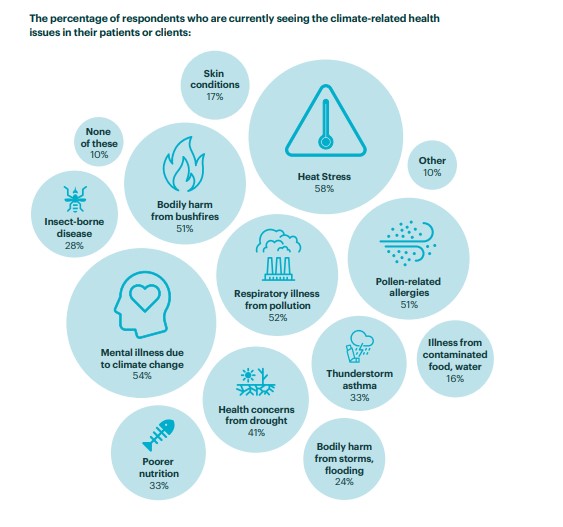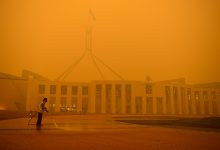A vast majority of Australia’s health professionals have warned that the health system is already being impacted by climate change and have called on the federal government to commit to stronger action to slash Australia’s contribution to global warming.
The survey, published by the Climate and Health Alliance, which was completed by 875 doctors, nurses and public health professionals from across Australia, found that a vast majority – 72 per cent – consider that climate change is already impacting on public health in Australia.
Additionally, 86 per cent of health professionals surveyed said that they wanted to see immediate action on climate change, and 83 per cent agreed that climate change was already disrupting the ability to deliver health services and was already having a damaging impact on healthcare infrastructure.
“The findings from this research confirm that climate change is a serious current threat to the Australian public, the health workforce, and healthcare services in Australia,” the report says.
“There are clear, substantive and increasing risks to the health of the community, and widespread concrete evidence that the provision of, and access to, health services by patients and the community are being disrupted by climate-related events. It is therefore imperative that greater action on climate change is realised in order to protect human health.”
The Climate and Health Alliance said that the public health threat posed by climate change was exacerbated by Australia’s vulnerability to extreme weather events and natural disasters.
Last year, damaging bushfires that impacted a significant portion of Australia’s eastern states resulted in widespread health impacts. In addition to the destruction of property and the loss of major infrastructure, significant volumes of smoke choked major cities for weeks as fires burned.
Research has estimated that the public health cost of the 2019-20 bushfire season – due to the smoke-related health impacts alone – totalled almost $2 billion, causing thousands of additional hospital admissions due to respiratory impacts.
“Australians are particularly vulnerable due to an already variable and extreme climate,” the Climate and Health Alliance’s report says.
“For instance, the unprecedented and climate-related bushfires of 2019-20 had major implications for public health, causing the death of 33 people. A further 417 deaths and 4,456 presentations to hospital have also been attributed to the bushfire smoke that blanketed the east coast of Australia.”
“In addition to direct health impacts through extreme events, climate change is also increasingly affecting many environmental and social determinants of health—clean air, safe drinking water, nutritious food, secure shelter and people’s livelihoods.”
CEO of the Public Health Association of Australia, Terry Slevin, said that the impacts of climate change were already becoming evident and that public health expertise had to play a central role in guiding any government response.
“It’s undeniable that climate change is affecting people’s health across Australia. As the climate heats up, extreme weather will become more frequent and intense and put our health system under enormous pressure,” Slevin said.
“The federal government must show leadership on climate change by ensuring healthcare is climate-resilient and delivering immediate emissions cuts to protect public health.”
“Our response to climate change must also be guided by the expertise and public health policy responses to combatting the COVID19 pandemic,” Slevin added.
More than half of health professionals reported that their workplaces had already been impacted by climate change-fuelled weather events, with the most commonly reported climate change-related health impacts already observed being heat stress, mental distress related to climate change, respiratory illnesses, bodily harm caused by bushfires, and pollen-related allergies.

The Climate and Health Alliance has previously issued on the federal government to adopt three core actions, including the prioritisation of health in Australia’s Nationally Determined Contributions on climate change under the Paris Agreement, a commitment to decarbonise the healthcare sector by 2040 and to implement a National Strategy on Climate, Health and Wellbeing for Australia.
Australian Medical Student Association President, Sophie Keen, said that medical students were increasingly concerned about the potential future impacts of climate change and called on the federal government to commit to cuts to greenhouse gas emissions.
“The survey confirms that medical students are highly alarmed about climate change, and how it will affect their workplace throughout their careers. The federal government must immediately cut emissions and make a plan so Australia’s healthcare services can cope with demand surge during extreme heat and disasters.”








